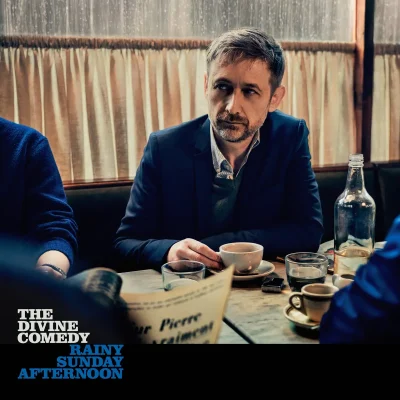
Neil Hannon is firmly ensconced as one of the premier songwriters of his generation. His way with words, his wit, and his ability to craft a song about two people in their dotage who, in order to find their inner child, end up involved in Battle re-enactments from British History (See ‘Norman And Norma’ from 2019’s Office Politics) is testament to this statement. It’s a well-earned accolade, and whilst some artists releasing their 13th studio album may be running the well dry, on Rainy Sunday Afternoon, this is not an accusation that can be levelled at The Divine Comedy.
Hannon turns from the absurd to the contemplative, from the wonder of Wonka to the quiet grieving of ‘The Last Time I Saw The Old Man’. To those familiar with The Divine Comedy, this volte-face should not come as a surprise; indeed, Hannon’s craft comes from being able to weave all the elements described above into a cohesive whole.
The record begins with ‘Achilles’, recounting the siege of Troy and framing it about the death of Achilles himself. The soundscape for this is reminiscent of a Western, all gunslingers and shootouts at dawn. This is followed by the aforementioned ‘The Last Time I Saw The Old Man’, which sees the narrator dealing with the effects of his father’s descent into his own mind, the illness undefined but described with care; “His eyes are affixed on landscapes afar, full of laughter and forgetting”.
In a way that is typically Hannon-esque, this moment of beauty is followed by a moment of humour, with ‘The Man Who Turned Into A Chair’, which can only be described as the theme tune to a long-forgotten 1960’s children’s tv show, backing vocals singing the title as the track loops around. It’s wonderfully inventive, and this one-two of songs again shows the talent of Hannon in The Divine Comedy.
This trend continues with ‘Mar-a-Lago By The Sea’, a throwback musically to the slow waltz’ often seen in Blackpool’s Tower Ballroom, but lyrically, ‘swapping wives for beauty queens’, and ‘all that ostentatious wealth, all those paintings of myself’, not exactly coded messages about a certain leader across the Atlantic Ocean.
The record ends with ‘Invisible Thread’, where the narrator’s lover is ‘stitched into his heart’, as he extolls them to ‘smile…leave…but just know, there will always be an invisible thread between you and me’. It’s a wonderful, plaintive song, and a great way to end a record that whilst not as upbeat as previous, is one that can connect with the listener on various emotional levels. It’s great to have Hannon back making Divine Comedy albums.
